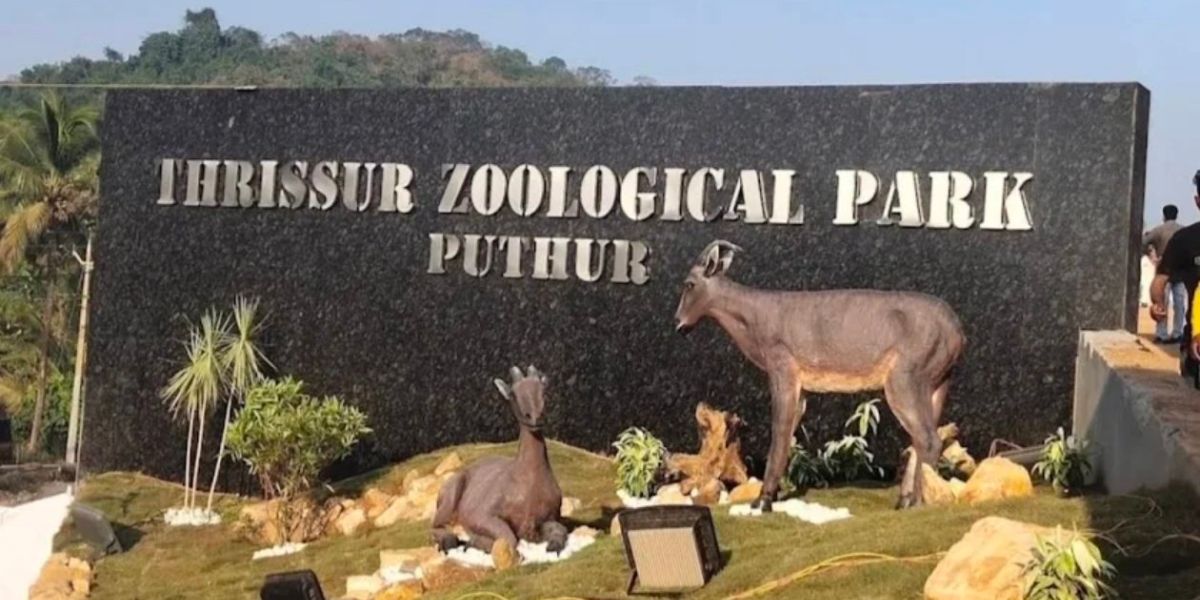Preliminary findings suggest a stray dog attack, with CCTV footage confirming the presence of dogs near the enclosure.
Published Nov 12, 2025 | 9:41 AM ⚊ Updated Nov 12, 2025 | 11:20 AM

Puthur Zoological Park in the Thrissur.
Synopsis: Ten spotted deer were found dead at the recently opened Puthur Zoological Park in the Thrissur district of Kerala. Preliminary findings suggest a stray dog attack, with CCTV footage confirming the presence of dogs near the enclosure.
Ten spotted deer were found dead on the morning of Tuesday, 11 November, at the recently opened Puthur Zoological Park in the Thrissur district of Kerala, which began operations on 28 October.
A red deer had also died a day earlier, taking the total deaths to 11 of the 21 deer in the park. The carcasses were discovered by staff around 6.30 am on Tuesday.
The deaths may have been caused by capture myopathy, a stress-induced metabolic disorder that can prove fatal in wild animals subjected to extreme fear or physical exertion.
A five-member team led by Chief Veterinary Surgeon Arun Zacharia is conducting post-mortem examinations, and samples have been sent for lab analysis.
Dr Zakaria explained that the incident occurred after a pack of stray dogs entered the zoo premises, triggering panic among the deer.
“The animals tried to flee in fear and sustained fatal injuries after hitting the enclosure walls. The immediate cause of death was capture myopathy,” he told the media.
Forest Minister AK Saseendran has ordered a detailed probe, directing a special committee to submit an initial report within four days and a final report within two weeks.
The incident has sparked concerns over mismanagement at the ₹275-crore facility, which lacks essential staff and safety measures. The park operates with only one staff member, has no curator, and its animal enclosures lack surveillance cameras.
Despite being touted as India’s largest zoological park, Puthur Zoo is running on a temporary permit from the Central Zoo Authority, which had listed 26 mandatory improvements; most of them remain unmet.
Since animal transfers began from the Thrissur Zoo last year, at least 26 animals have died, highlighting continuing lapses in the park’s management and safety standards.
Touted as the second-largest zoological park in Asia and India’s first designer zoo, this 336-acre zoo in Puthur Kurishumula is aimed at transforming wildlife tourism and conservation in the state.
The new park has been designed to mimic the natural habitats of wild animals, marking the end of an era for the historic Thrissur Zoo at Chembukavu, which will be completely shut down once all animals are relocated.
The Puthur Zoological Park is divided into 23 themed habitats, representing diverse ecosystems such as the African Zulu Land Zone, Kanha Zone, Silent Valley Zone, and Iravipuram Zone.
Dr Zakaria described capture myopathy — also known as exertional rhabdomyolysis, white muscle disease, or stress myopathy — as a non-infectious metabolic condition that develops after prolonged pursuit, entrapment, restraint, or transport.
It causes severe muscular and systemic damage, often leading to death. He added that the dogs might have entered the zoo, attracted by garbage discarded by staff or other food waste.
“Possible entry points for the stray dogs have been identified. Measures should be taken to plug these gaps immediately. While zoo animals cannot escape from their enclosures, it is equally critical to ensure that no outside animals enter the premises,” he said.
Meanwhile, Chief Wildlife Warden Pramod G Krishnan said that the department would look into the circumstances surrounding the incident, including the possibility of staff negligence.
“We will verify whether the staff had opened the enclosure doors for feeding at the time,” he said.
A three-member committee comprising Krishnan, Forest Vigilance Wing CCF George P Mathachan, and Dr Arun Zakaria has been constituted to conduct a detailed probe.
Officials said preventive measures will be strengthened to ensure the safety of animals at the Puthur Zoological Park and to prevent any recurrence of such incidents.
(Edited by Muhammed Fazil with inputs from Sreelakshmi Soman.)
